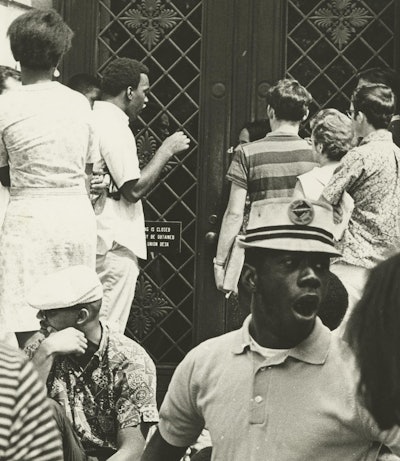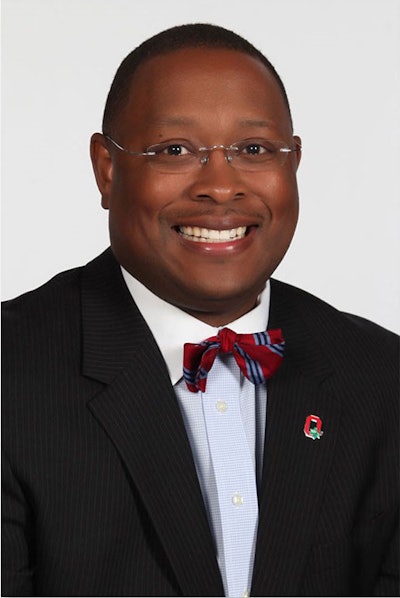In April 1968, four female students were riding the bus home from a meeting of the Black Student Union at The Ohio State University. They began discussing the atmosphere they found themselves in. It was just two weeks after the assassination of Dr. Martin Luther King Jr. The driver, a white man, told them they couldn’t talk about that. He then called campus police, who made the women get off the bus.
 Photo of students outside the administration building at OSU in 1968
Photo of students outside the administration building at OSU in 1968The Black Student Union met with officials the next morning to discuss what had happened. When talks fell apart, the 60 plus Black students in the office of administration refused to leave without a solution. By noon, the building was sealed off from entry. White and Black students began to gather in solidarity outside the building.
The air was tense—there was talk of notifying the national guard. Ten hours later, the university came to an agreement: it had not been doing enough for its Black populace. The students were then presented with a piece of paper and told that signing it would excuse their absence from class. The 34 who signed were indicted for trespassing, some even charged with kidnapping. Eight students were expelled.
The OSU 34, as they have come to be known, are now being honored with eleven others this week as the first class inducted into the OSU Office of Diversity and Inclusion Hall of Fame.
“[The OSU 34’s] impact is significant,” said Kimberly McCalla, the director for external engagement, alumni affairs, and special events at OSU. “These students challenged the status quo. They held the university accountable.”
The Office of Diversity and Inclusion at OSU is one of the oldest in the nation and the events in 1968, helped to create the office in 1970. Now, they are celebrating their 50th anniversary with the first annual presentation of this award.
“This is the first time we as a university and the office of diversity and inclusion are taking a moment to celebrate those individuals who’ve made a sustained impact on diversity, equity, and inclusion,” said McCalla. The two-night event took place virtually.
The twelve inductees range from the first Black woman to achieve a Ph.D. in natural sciences, Dr. Ruth Ella Moore; to famed Olympian Jesse Owens; to Republican Congressman William M. McCulloch, who went against his party to help enact voting rights legislation in the 1960s.
The office of diversity and inclusion received almost 200 applications for induction. A ten-person selection committee went through a multi-stage vetting process. Graduates from OSU have had “unbelievable careers,” said McCalla. “If you can think of it, we have it!”
“It was extremely rewarding when you would read some of these stories,” McCalla said, adding that many had been “forgotten” before now.
 Dr. James L. Moore, III
Dr. James L. Moore, IIIThe selection committee awarded those with ties to OSU, and who had “a sustained body of work, who were champions for diversity, equity and inclusion,” said Dr. James L. Moore, III, vice provost for diversity and inclusion and chief diversity officer at OSU.
The celebration featured interviews with the recipients themselves or family members of those receiving the award posthumously. Moore, the recipient of the 2021 Reginald Wilson Diversity Leadership Award from the American Council on Education (ACE) was the evenings’ architect.
“It is imperative that we honor the iconic giants whose shoulders we stand on to accomplish all that we do in this world,” he said. “These are men and women who have succeeded in the face of adversity,” said Moore.
Moore said that he constantly reminds his students that they “walk on hallowed ground.”
Playon Patrick, an OSU student and spoken word poet, performed at the event on Wednesday night. He referenced the OSU 34 as having paved the way through darkness.
“When inequality seems to be knocking on the front door and you can’t remember why you’re here, remember: you are excellent,” Patrick said.
Eventually, every member inducted this week will be represented in a physical space on campus. COVID-19 has put those renovation and construction plans on hold for now.
“We’re hoping that people walk away [from these nights] empowered and knowing that they have a role in this,” said McCalla. “There are so many untold stories—so many [students] walk around and don’t know the shoes they’re walking in… Someone had to break the door down…. This type of an award is the reminder and push that you can be that person.”
Liann Herder can be reached at [email protected]





















